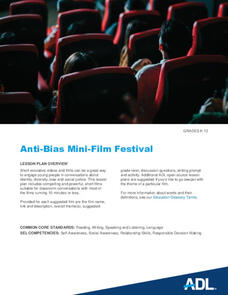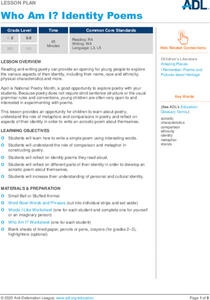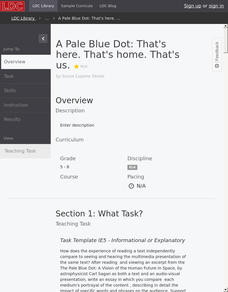University of Minnesota
Chemotaxis Using C. elegans
Have you ever wondered what roundworms are like? Or what they don't like? Explore the sensory preferences of C. elegans through this controlled chemotaxis experiment. Biology class members brainstorm what substances might attract—or...
University of Minnesota
Memory Items
Ready to have an "unforgettable" time in science class? Try a fun and insightful activity, suitable for a wide age group of learners. Explore how human memory works when pupils try to remember objects they've seen before comparing the...
Anti-Defamation League
Impact of the U.S. Expansion on Indigenous People and Stereotypes About Native American People
The 2004 U.S. bicentennial sparks a discussion about its meaning and importance to United States history. Readings, maps, tables, and reflective writing prompt small groups to explore the westward expansion, Lewis and Clark, and how...
Anti-Defamation League
Anti-Bias Mini-Film Festival
Imagine a resource that provides all the materials you need to organize a film festival. Imagination becomes a reality with a five-star resource that has done all the work for you. Eight different award-winning short films are featured...
Anti-Defamation League
8 Ideas for Teaching National Hispanic Heritage Month
Here are eight ideas to celebrate National Hispanic Month! Scholars have the opportunity to read and discuss literature, include people and events in history, examine art, watch and discuss films, listen to and dance to music, explore...
Anti-Defamation League
Dolls Are Us
Representation matters! A lesson examines the looks of dolls and discusses whether the design is inclusive or not. Scholars create a paper doll representing a characteristic about themselves or highlights another diverse quality....
Anti-Defamation League
Who Am I? Identity Poems
A lesson celebrating identity begins with a something-about-me activity, then moves on to writing favorite words. Class members then brainstorm metaphors and comparisons and read a poem to inspire their poetic abilities. Scholars craft...
Anti-Defamation League
Toys and Gender
As you walk down the toy aisle, it's easy to see that toy packaging is based on gender stereotypes. Here, a lesson challenges scholars to look past the stereotypes and value a toy for what it is and the joy it brings. Through thoughtful...
Carolina K-12
How Do I Pre-Register and Vote in North Carolina?
Did you know that in some states your pupils can pre-register to vote? Teach the advantages to pre-registering and engage the classroom in an intriguing discussion about youth voting trends. Class members participates in a live polling...
Smithsonian Institution
The Birth of an Icon: Learning and Performing the Origins of the Drum Set and Early Jazz Drumming in New Orleans, Louisiana
Bass drum, snare drum, tom-toms, cymbals. Perched behind their drum sets, wielding their drum sticks and wire brushes, drummers lay the grove and are the heartbeat of a band's performance. A dynamic instructional activity introduces...
Nemours KidsHealth
Keep Your Brain in the Game: Grades 3-5
Boost physical activity as well as concept proficiency with brief bursts of movement. Before taking a test, scholars vote on five exercises to complete from a set of 8 cards. After two minutes, learners begin their work with heightened...
Greater Good Science Center
Nurturing Gratitude From the Inside Out: 30 Activities for Grades K–8
Teach the importance of showing gratitude at any age with a teacher's guide comprised of thirty activities. Browse the extensive table of contents to find the array of exercises designed to meet the needs of your learners. Scholars take...
EngageNY
Grade 5 Math Module 1, Topic D, Lesson 10
Take a little bit away. The 10th section of an 18-part unit introduces subtraction of decimals. Scholars use a place value chart like they did with addition of decimals to organize and represent the problem. After using the place value...
EngageNY
Grade 5 Math Module 1, Topic D, Lesson 9
Introduces addition of decimals by using unit notation to represent the problem. Pupils use a place value chart to decompose the numbers and then add before connecting to the standard algorithm.
EngageNY
Grade 5 Math Module 1, Topic C, Lesson 8
Go another round on rounding. Pupils refine their learned rounding skills in the eighth installment in an 18-part unit on decimals. The instructional activity takes away some of the previous scaffolding to encourage scholars to use the...
EngageNY
Grade 5 Math Module 1, Topic B, Lesson 6
Which is bigger? The sixth installment in an 18-part series covering decimals provides a instructional activity on comparing decimals to the thousandths. Teachers use place value to help class members compare and order decimals....
EngageNY
Grade 5 Math Module 1, Topic B, Lesson 5
There is more than one way to write a number. The lesson plan provides teachers with a way to teach reading and writing decimals to thousandths using standard, expanded, and unit forms. Pupils work through in-class and homework...
EngageNY
Grade 5 Math Module 1, Topic A, Lesson 4
Convert with exponents. The fourth lesson in a series of 18 uses powers of 10 to convert within the metric system. Scholars use their fourth grade knowledge of conversions to write and use the conversion factors containing exponents....
EngageNY
Grade 5 Math Module 1, Topic A, Lesson 3
The activity introduces exponents as a way to write powers of 10 and to associate those powers with place value. Pupils practice writing powers of 10 with exponents along with multiplying numbers by powers of 10. The resource is the...
EngageNY
Grade 5 Math Module 1, Topic A, Lesson 2
What are the place value patterns? An informative lesson plan helps scholars build upon their knowledge of place value to see patterns when multiplying and dividing by powers of 10. Classmates begin the second installment by reviewing...
EngageNY
Grade 5 Math Module 1, Topic A, Lesson 1
Extend the place value system. The first lesson plan in a series of 18 extends the place value system to millions through thousandths. Using place value charts, pupils see how the value of a digit changes as it moves places. Teachers use...
Literacy Design Collaborative
A Pale Blue Dot: That's Here. That's Home. That's Us.
21st-century learners live in such a visual world that many are unused to letting their minds imagine the picture that words create. An excerpt from Carl Sagan's lecture, "The Pale Blue Dot: A Vision of the Human Future in Space,"...
Purdue University
Field Trip Snack Holder
Is light related to insulation? An informative hands-on STEM activity demonstrates how light affects temperature. First, the class investigates how light passes through different mediums and how that relates to temperature. Then,...
Purdue University
Simple Machines – Dog Gone It!
How can people use simple machines to solve real-world STEM problems? Learn about simple machines using a hands-on, project-based learning activity. First, pupils investigate and evaluate simple machines. Then, they receive a task that...

























